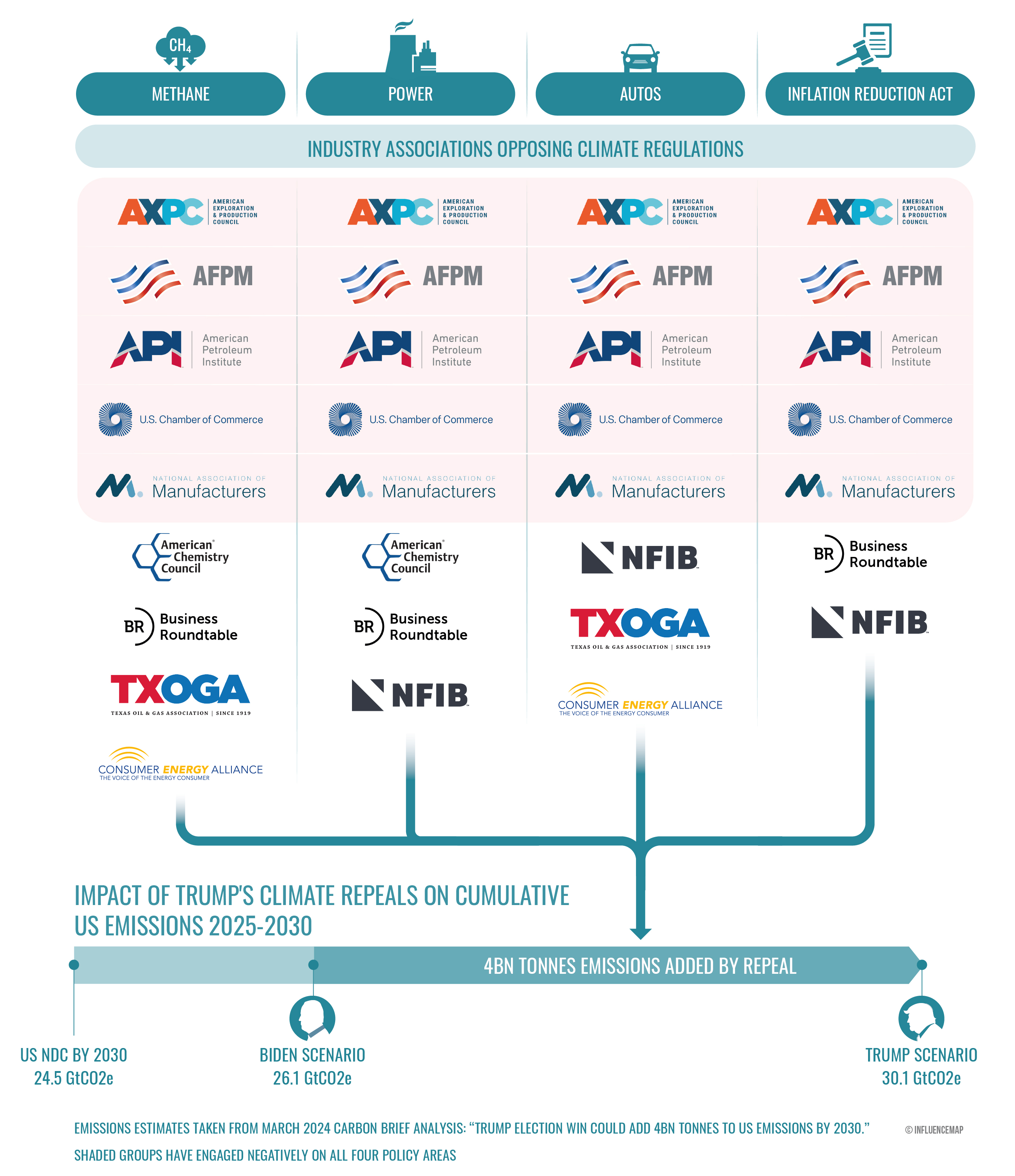New research from InfluenceMap finds early evidence of entrenched fossil fuel interests seeking to influence and benefit from a second Trump administration. Many of the tactics already being deployed by industry are reminiscent of the first Trump presidency, indicating a continuation of familiar fossil fuel tactics to shape climate policy and politics.
Combining recent evidence with insights from the first Trump administration, this research identifies three recent trends that are likely to escalate in the second Trump term. These are:
Fossil fuel companies shifting from defensive to offensive strategies to reverse ambitious climate policy:
- As in 2016, the most entrenched fossil fuel interest groups are likely to shift their attention from lawsuits to rollbacks – something InfluenceMap has already found evidence of entities such as the American Petroleum Institute (API) and ExxonMobil laying the groundwork for.
- For example, having filed legal challenges on automotive and methane regulations, post-election the API released a “5 Point Policy Roadmap” specifying a series of actions that Trump’s administration can take to roll back auto and climate regulations. Additionally, in a public statement after the election, ExxonMobil criticized the climate measures passed under the Biden administration.
- This is reminiscent of the first Trump administration: before President Trump assumed office in 2017, industry had filed a number of lawsuits against the US Environmental Protection Agency (EPA) for its climate-related regulations. When Trump assumed office, entities shifted focus from lawsuits to rollbacks with at least seven major associations calling for repeal of the Obama-era Clean Power Plan alone.
Escalating advocacy on permitting infrastructure – particularly gas:
- According to InfluenceMap research, issues of energy infrastructure and permitting reform have seen more engagement than any other area of climate policy in the last eighteen months. Evidence of engagement comes from a wide array of entities, both positive and negative, from clean energy industry associations like Advanced Energy United calling for improved transmission infrastructure, to fossil fuel companies and cross-sector associations like the US Chamber of Commerce calling for quicker approvals of liquefied natural gas export projects. Across every state with fossil gas consultations, utilities have responded with concerns regarding grid reliability, transmission capacity, and costs to consumers.
The strategic use of narratives, such as “consumer choice”, to maintain public support and secure wins:
- During the first Trump administration, InfluenceMap analysis revealed the vast amount of time and resources that fossil fuel companies invested in reaching the public to protect their “social license” or public reputation. Going into 2025, corporate entities opposed to climate action will no longer need to convince the administration of their aims. Instead, they are likely to turn attention to influencing the public, leveraging specific, nuanced narratives on climate that protect and promote fossil fuels.
- In 2024, the issue of “consumer choice” was a central part of the Trump campaign’s messaging as it criticized automotive regulations in swing states like Michigan. In strikingly similar messaging, corporate interests such as ExxonMobil and the API publicly leveraged this exact narrative on over 100 different occasions in 2024 alone.
- Strategic use of narratives will remain common, particularly as some fossil fuel interests attempt to position themselves as “good guys” and proponents of climate action once again – as evident in recent statements by ExxonMobil and Cheniere Energy supporting the Paris Agreement.
After entering office, President Trump can be expected to deliver on his promises to repeal all major environmental regulations, exit the Paris Agreement, and immediately deploy executive powers to reverse Biden administration actions like the pause on LNG exports. This analysis also directly links the advocacy of five major industry associations— the American Exploration and Production Council (AXPC), US Chamber of Commerce, the American Petroleum Institute (API), the National Association of Manufacturers, and the American Fuel and Petrochemical Manufacturers (AFPM) — to the increase in emissions that will result from Trump’s rollbacks, equivalent to the combined annual emissions of the EU and Japan (1).
The graphic below captures the industry associations that, even before the election, actively sought to overturn, weaken, or litigate against federal climate action. The shaded groups have engaged negatively on all four policy areas captured.
Figure 1: Industry Associations, Climate Policy and Likely Impact on US GHG Emissions
Kendra Haven, Director of Projects at InfluenceMap said:
"It is alarming to see the extent to which fossil fuel actors are gearing up to use their old tactics to roll back climate policy and present themselves as the “good guys” ahead of the next presidency. We can expect industry associations to be at the forefront of the most negative advocacy in the US going into 2025, just as they were during the first Trump term, providing essential cover for individual companies. The science is clear, as is the long-term harm this advocacy will cause to climate and communities. Misleading narratives from industry must be challenged accordingly.”
This briefing draws on analysis of companies and industry associations contained in InfluenceMap’s US platform, which has now expanded to include information on corporate policy engagement in the five largest US states by GDP.
Click here for full report and graphics.
For further information or to arrange interviews, please contact:
Kitty Hatchley, Press Officer, InfluenceMap (London)
Email: kitty.hatchley {@} influencemap.org
Notes to Editors
(1) According to research from Carbon Brief
